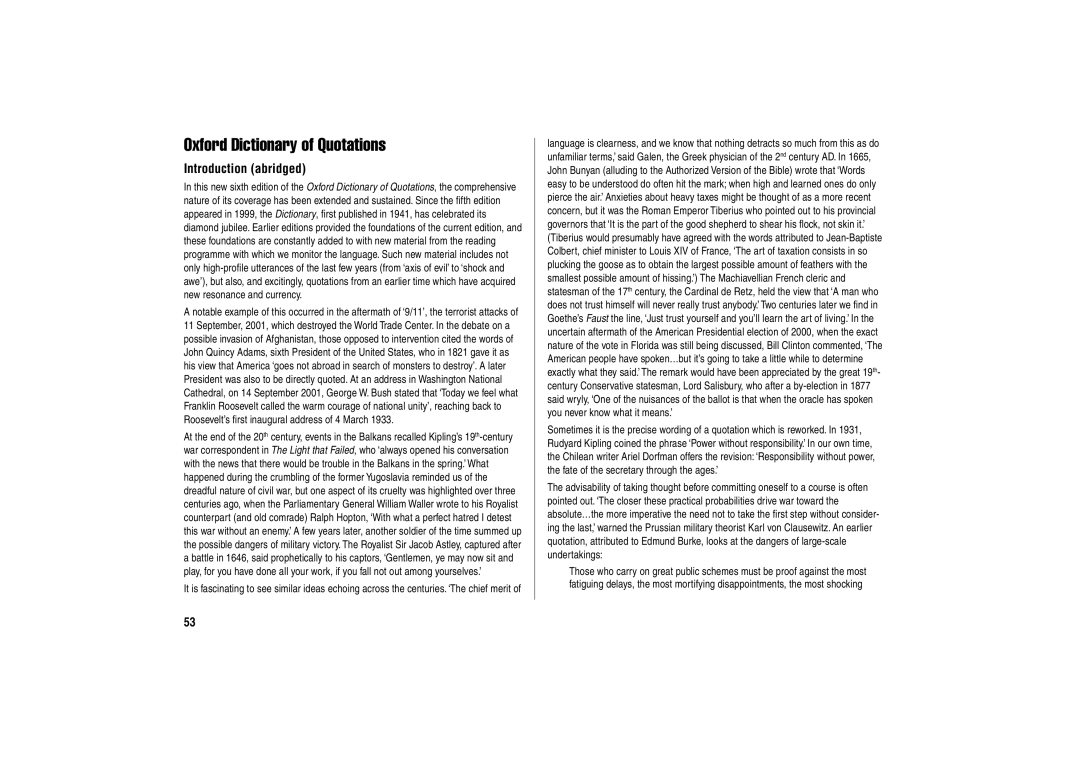Oxford Dictionary of Quotations
Introduction (abridged)
In this new sixth edition of the Oxford Dictionary of Quotations, the comprehensive nature of its coverage has been extended and sustained. Since the fifth edition appeared in 1999, the Dictionary, first published in 1941, has celebrated its diamond jubilee. Earlier editions provided the foundations of the current edition, and these foundations are constantly added to with new material from the reading programme with which we monitor the language. Such new material includes not only
A notable example of this occurred in the aftermath of ‘9/11’, the terrorist attacks of 11 September, 2001, which destroyed the World Trade Center. In the debate on a possible invasion of Afghanistan, those opposed to intervention cited the words of John Quincy Adams, sixth President of the United States, who in 1821 gave it as his view that America ‘goes not abroad in search of monsters to destroy’. A later President was also to be directly quoted. At an address in Washington National Cathedral, on 14 September 2001, George W. Bush stated that ‘Today we feel what Franklin Roosevelt called the warm courage of national unity’, reaching back to Roosevelt’s first inaugural address of 4 March 1933.
At the end of the 20th century, events in the Balkans recalled Kipling’s
It is fascinating to see similar ideas echoing across the centuries. ‘The chief merit of
language is clearness, and we know that nothing detracts so much from this as do unfamiliar terms,’ said Galen, the Greek physician of the 2nd century AD. In 1665, John Bunyan (alluding to the Authorized Version of the Bible) wrote that ‘Words easy to be understood do often hit the mark; when high and learned ones do only pierce the air.’ Anxieties about heavy taxes might be thought of as a more recent concern, but it was the Roman Emperor Tiberius who pointed out to his provincial governors that ‘It is the part of the good shepherd to shear his flock, not skin it.’ (Tiberius would presumably have agreed with the words attributed to
Sometimes it is the precise wording of a quotation which is reworked. In 1931, Rudyard Kipling coined the phrase ‘Power without responsibility.’ In our own time, the Chilean writer Ariel Dorfman offers the revision: ‘Responsibility without power, the fate of the secretary through the ages.’
The advisability of taking thought before committing oneself to a course is often pointed out. ‘The closer these practical probabilities drive war toward the absolute…the more imperative the need not to take the first step without consider- ing the last,’ warned the Prussian military theorist Karl von Clausewitz. An earlier quotation, attributed to Edmund Burke, looks at the dangers of
Those who carry on great public schemes must be proof against the most fatiguing delays, the most mortifying disappointments, the most shocking
53
